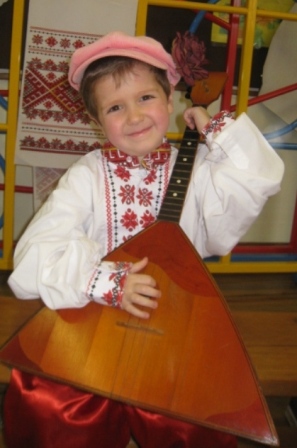| Last week the
reception pupils of Charford First School
in Bromsgrove, Worcestershire had a chance to travel around Russia as part
of the 'Countries around the world' festival. Even though their journey around Russia was mostly virtual with the help of the
computer, the children had a chance to get a glimpse of what Russia has on offer. They 'had a
stroll' in Red Square, 'visited' the
Hermitage, 'looked inside' Cruiser Aurora, 'had a flight' over the vast Taiga
forest and the silent ice-covered Russian Far East. The children were given a
chance to cut out and colour in Matreshka dolls and draw a Siberian tiger.
During the course of
the Russian week, the Reception pupils listened to Russian songs and
traditional stories, watched famous Soviet animation films, had a go at making
honey bread biscuits ('pryanik'), found out how a samovar worked, the
fundamental difference between a balalaika and a guitar...
The samovar, balalaika
and many other artefacts were kindly supplied by the British-Russian Cultural
Centre in Birmingham - RUBRIC.
Towards the end of the
week, the school was visited by a RUBRIC delegation. RUBRIC teachers, dressed
in traditional Russian costumes, taught the children some common Russian words.
Elena Meznikova, a dance teacher, gave the Charford pupils a Russian dance
master class. She was assisted by two young talents - Stesha and Dania Wright.
Only twenty years ago,
it was impossible to imagine that British school children would get a chance to
sing Russian songs and have a go at a traditional Russian dance - admitted
Lorraine Edwards, one British Grandmother. In my day Russia was something to be afraid
of and our knowledge of Russian culture was limited to the words 'ushanka,
medved', vodka'. But now Russians are represented by a large Russian community
here in Britain.
My granddaughter is friends with a Russian boy.
'Events like the Russian
week at Charford First School
are very important for British-Russian cultural relations', says Nadezhda
Loginova, RUBRIC Director. Irina Korovina, Birmingham Russian School
Coordinator, adds: 'We will try to turn 'Russian weeks' into a tradition and make
them into regular events'.
Evgeniy Dorenskiy
journalist Photos
| 



